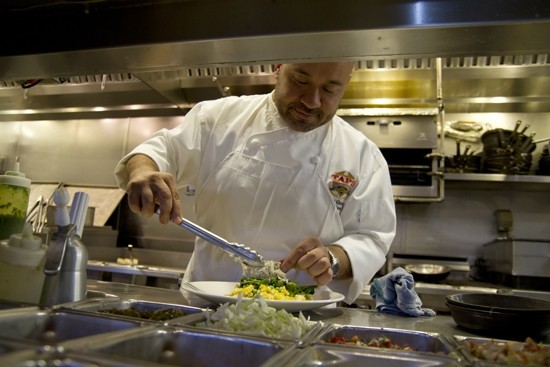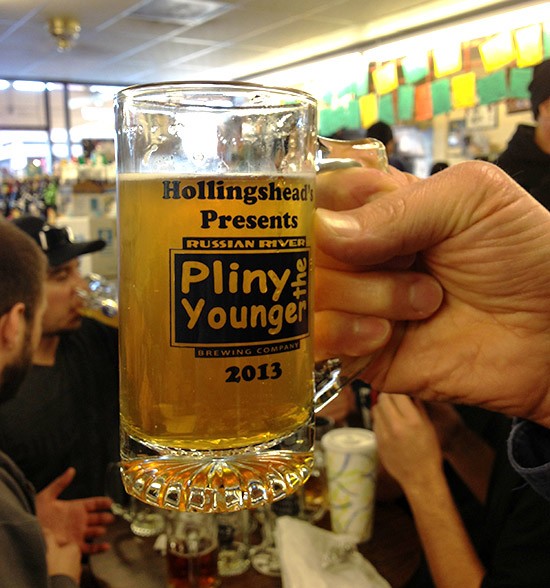
The economics of beer seem simple enough. Beer is the “every man's drink” so if it's in supply, there will be demand. If you want to sell lots of beer, why would you ever limit your supply?
But it's not so simple with craft beer. Every one's run into limited-release beers at least once, your Pliny the Youngers or Smoked Porters with Vanilla Bean. There's demand, people want to drink them, so why the limited release?
Well, the reason is two-fold. You have your natural scarcity, driven by rare ingredients and extra preparation time, and then there's your artificial scarcity, meant to build buzz and grow lines. They each play into limited release beers. Just how? Well..
]
Natural Scarcity

Sometimes, scarcity just can't be avoided.
Craft brewers experiment with rare hops, chocolate, fruit, flowers, coffee or peppers — ingredients that aren't always readily available. Beers aged in barrels need time to be, well, aged.
TAPS Fish House and Brewery in Brea, known for committing to traditional beer styles, started barrel-aging to keep up with other breweries opening in Orange County, according to TAPS brewmaster, Victor Novak. One of their aged beers, an imperial Russian stout aged in bourbon barrels called Trace of Remy, is only released once a year and tends to sell out within a week.
“It's the age factor,” says Novak. “We don't hold it to create the demand.”
Although Trace of Remy does not contain any seasonal ingredients, the beer requires at least a year to age in the bourbon barrels.
Similar to Trace of Remy is the well-known Black Tuesday from Placentia-based The Bruery. Also a barrel-aged imperial stout, the once special release beer is, according to Director of Marketing Benjamin Weiss, no longer hard to get. The Bruery features this beer in their taproom specifically on Oct. 29, the historic “Black Tuesday” when the stock market crashed in 1929, but the beer is available to, as Weiss said, “anyone with a computer.”
Garrett Johnson, a master of business from USC, long-time bottle trader and avid craft beer drinker, doesn't buy that all craft breweries accidentally generate scarcity.
“[Black Tuesday] is a good beer, it is something you can enjoy (to an extent), but if you could have it anytime you wanted, you would hesitate paying $30 for it,” he said. “The rarity keeps the cost up.”
Johnson was also an active buyer and seller of rare beers on eBay when the site allowed the sale of alcohol. A number of breweries scolded him for selling rare bottles at a markup price over the Internet.
“It's simple economics,” he said. “The breweries were setting the supply price, but not letting it fluctuate with the demand.”
While this theory may appear true, The Bruery doesn't always think strictly in business terms. Craft brewers tend to be the biggest beer drinkers.
“Diversity is exciting,” Weiss said. “Becoming the 'Black Tuesday' brewery doesn't really sound very fun. Plus, we drink a lot of our own beer and we need something a bit more [on] occasion.”
[
Artificial Scarcity

Piqued by the success of scarce beers, many OC craft breweries have taken it upon themselves to create their own “artificial” scarcity. Brew something with a “forbidden fruit” and customers go wild. It also helps if the beer is good.
A prime example is Noble Ale Works' Naughty Sauce, a Portola coffee milk stout on nitro that crowds happily wait in line for on its sporadic casking day. There's no barrel-aging and no shortage of Portola Coffee in Orange County.
Kyle Manns, current head brewer at the soon-to-be-open Bottle Logic, spends time think about how the new brewery can fiddle with artificial scarcity. Bottle Logic will produce a new beer every week in addition to having their flagship beers on tap.
But at the end of the day, craft brewers are beer-drinkers, not businessmen. They get into this business because they enjoy well-crafted beer. They produce these beers not to get a leg up or to become the only fun beer you take to a dinner party, they play with rare ingredients and bend the traditional laws of brewing because they want to.
“With our pilot batches, stainless barrels, and smaller brite tank, we will surely offer products that are scarce,” Mann said. “But that's part of the fun right?”
Follow Stick a Fork In It on Twitter @ocweeklyfood or on Facebook! And don't forget to download our free Best Of App here!

